倒装句讲解和练习
倒装句讲与练

一、方向性副词置于句首,完全倒装1..以there, here, now, then引导的,引起人们注意的招呼句,要全部倒装。
There goes the bell.铃响了。
Here comes the bus.车来了。
Now comes your turn.轮到你了。
Then came another disaster.Here is a letter for you.Off went the horse.马跑了。
In came the teacher.老师进来了。
Away fled the thief.Up into the sky flew the arrow.Down into the water fell the meat.2010全国阅读Along the river banks of the Amazon there lives a bird called the hoatzin that swims before it can fly, and has claws (爪) on its wings when young.2. 表地点的词语置于句首或强调地点概念时全部倒装。
On the table were some flowers.桌子上有一些花。
Between the two buildings stands a tall tree. 在两幢楼之间有一棵大树。
In the dark forests lie many lakes, some large enough to hold several Englishtowns.在黑暗的森林里有许多湖泊,其中有一些有几个英国城镇那么大。
Among all these presents is included a very nice watch, which was given by my teacher John.★当句子的主语有人称代词担当时,句子不倒装,如:Here it is/Here you are.Away they went.Here he coms.★时态Look, the bus is coming! = Look, here comes the bus!2010江苏33.--- Is everyone here?--- Not yet……Look , there_______ the rest of our guests!A. comeB. comesC. is comingD. are coming二、否定词置于句首,部分倒装。
高中英语倒装句讲解以及习题(附答案)
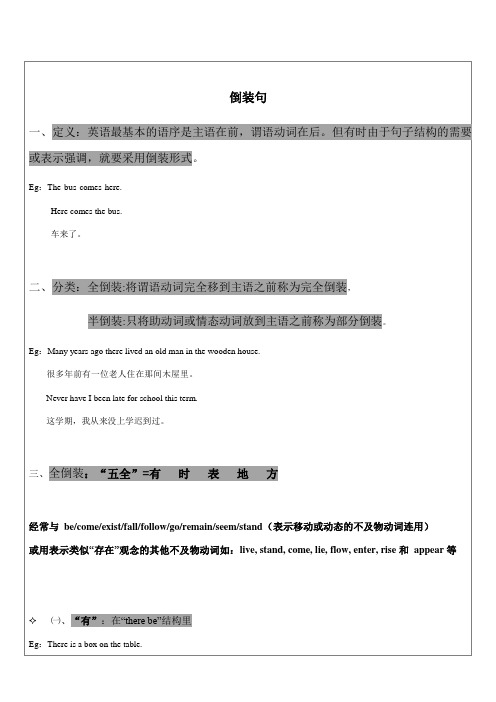
桌子上面有一个盒子。
✧㈡、“时”:表示时间副词,如:now,then,
Eg:Now comes your turn.
现在轮到你了。
✧㈢、“表”:表语放句子前,“表语+系动词+主语” 的结构
Eg:Present at the party were Mr. Green and many other guests.
格林先生和其他的客人在这个聚会上。
Seated on the ground are a group of young men.
一群年轻人坐在了地上。
✧㈣、“地”:地点状语放在句首
Eg:In south of the river lies a small factory.
小工厂位于河的南方。
From the valley came a cry.
山谷传来一阵哭声。
✧㈤、“方”:表方位的副词here, there 或out, in, up, down, away, off 等标志词放在句首 Eg:There lies a large wheat field in front of the house.
房子前面有一大片麦田。
Off all the lights went when I came in.
当我进来时,所有的灯都灭了。
四、半倒装:“八部”=不只让步也常需(虚)如此祝福✧㈠、“不”表示否定。
(完整版)倒装句精讲及练习(含答案)

倒装句的用法英语倒装句分为两种:1、整个谓语在前的句子,叫完全倒装。
Here comes the car.2、部分谓语(情态动词、助动词、连系动词)在前,谓语的主体部分仍在主语之后的句子,叫部分倒装句。
Only then did he realize that he was wrong.必须弄清的两点:①若有主从句,哪句倒装。
②部分倒装还是完全倒装。
一、表示方位和时间的副词位于句首时(now ,then here ,there,out ,in ,up,down ,away ,back,off,on ), 句子全部倒装。
注:主语是代词时,不倒装。
(如 5,6)1.Here comes the bus .2.There goes the bell .3.Away went the students .4.Now comes the chance .Out rushed the children. he rushed.There comes the bus. 注意: 1.不能用进行时;he comes.2. 主语为人称代词时不倒装。
二、以介词短语表示的状语,提前位于句首时,全部倒装。
1.In a lecture hall of a university in England sits a professor .2.In front of our school stands a tower .3.By either side of the river grow a lot of apple trees .4.At the top of the mountain stands a temple .5. Among the goods are Christmas trees,flowers and toys.三、表语位于句首时,倒装结构为“表语+连系动词 +主语”A:形容词 +连系动词 +主语例 1.Present at the meeting were Professor White,Professor Smith and many other guests. 例 2.过去分词 +连系动词 +主语Gone are the days when they could do what they liked to the Chinese people.四、将 so\neither \nor 放在开头 ,表示“ 也 (不 )”的意思时 ,部分倒装注: 表示“确实是这样”时 ,不倒装1.He went to the film last night.So did I .2.You must finish your work ,so must I .3.She is interested in the story ,so am I .4.He didn ’ t turn up .Neither did his brother .5.His mother told him not to go to the film .So he did.五、在 if 条件 :在 if 条件句中 ,通常可以省略条件句 ,必须含有系动词if , 而将从句倒装were,助动词had 和情态动词should1.Were he younger(=If he were younger ),he would learn skating .2.Should they forget (=If they should forget ) to bring a map with them ,they would get lost inthe woods .3.Had they realized (=If they had realized ) how important the task was ,they wouldn ’ t have refused to accept .4.Were I you ,I would help her .六、否定词或半否定词(never .little ,seldom ,not ,nowhere ,scarely ,few ,by no means ,at no time ) 位于句首 ,应部分倒装1.Never have I been there .2.Little did I know about it .3.Seldom did she come late to school .4.Not a single mistake did he make .5.By no means should you buy that kind of car .七、以 not until,no sooner than , hardly when ,not only but also 所引导的状语放在句首时 ,需要部分倒装1.Not until 10 ’clock will the library open .2.No sooner had I gone out than he came to see me .3.Hardly had the train arrived when I ran to meet my friend.4.Not only does she speak English but also she follows the British way of life .八、 only及其修饰的状语位于句首时,后面的句子部分倒装。
英语倒装句讲解与练习

倒装句1.部分倒装部分倒装是指把谓语的一部分(助动词、系动词或情态动词)置于主语之前(一般疑问句语序)。
这类句型主要有以下几种形式:(1)当否定词或带有否定意义的词或短语位于句首时,常用部分倒装。
这类词或短语有:little, few, never, seldom, rarely, by no means, not only, not until, at no time, under/in no circumstances, in no case, in no way, no sooner, hardly, scarcely等。
(2)当only修饰的副词、介词短语或状语从句位于句首时,用部分倒装。
Only when you can find peace in your heart will you keep good relationships with others.只有当你找到内心的平静时你才能与他人保持良好的关系。
(3)so/neither/nor置于句首时,用部分倒装。
①“so+be/助动词/情态动词+主语” 表示前面所说的肯定情况也适合于另一人或物,意为“……也是如此” 。
—I’ve got an enormous amount of work to do.——我有大量的作业要做。
—So have I.——我也如此。
②“neither/nor+be/助动词/情态动词+主语” 表示前面否定的内容也适用于另一人或物,意为“……也不这样” 。
My friend wasn’t happy,neither was I.(4)在so/such... that... 结构中,当“so+形容词/副词” 或“such+名词” 位于句首时,用部分倒装。
So suddenly did he catch the disease that the whole family were at a great loss. 他突然患病,全家人全然不知所措。
倒装句专题讲解及练习
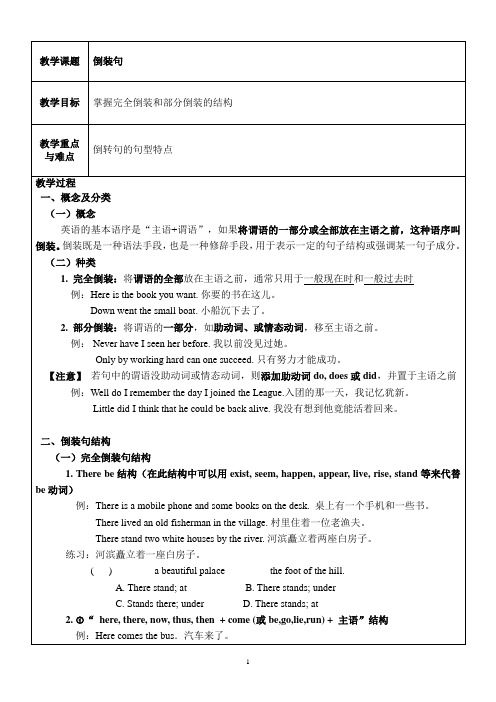
教学课题倒装句教学目标掌握完全倒装和部分倒装的结构教学重点倒转句的句型特点与难点教学过程一、概念及分类(一)概念英语的基本语序是“主语+谓语”,如果将谓语的一部分或全部放在主语之前,这种语序叫倒装。
倒装既是一种语法手段,也是一种修辞手段,用于表示一定的句子结构或强调某一句子成分。
(二)种类1. 完全倒装:将谓语的全部放在主语之前,通常只用于一般现在时和一般过去时例:Here is the book you want. 你要的书在这儿。
Down went the small boat. 小船沉下去了。
2. 部分倒装:将谓语的一部分,如助动词、或情态动词,移至主语之前。
例: Never have I seen her before. 我以前没见过她。
Only by working hard can one succeed. 只有努力才能成功。
【注意】若句中的谓语没助动词或情态动词,则添加助动词do, does或did,并置于主语之前例:Well do I remember the day I joined the League.入团的那一天,我记忆犹新。
Little did I think that he could be back alive. 我没有想到他竟能活着回来。
二、倒装句结构(一)完全倒装句结构1. There be结构(在此结构中可以用exist, seem, happen, appear, live, rise, stand等来代替be动词)例:There is a mobile phone and some books on the desk. 桌上有一个手机和一些书。
There lived an old fisherman in the village. 村里住着一位老渔夫。
There stand two white houses by the river. 河滨矗立着两座白房子。
英语倒装句讲解及练习
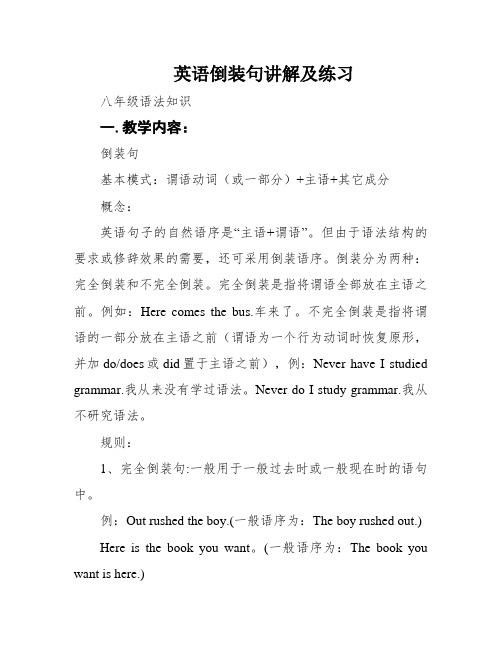
英语倒装句讲解及练习八年级语法知识一.教学内容:倒装句基本模式:谓语动词(或一部分)+主语+其它成分概念:英语句子的自然语序是“主语+谓语”。
但由于语法结构的要求或修辞效果的需要,还可采用倒装语序。
倒装分为两种:完全倒装和不完全倒装。
完全倒装是指将谓语全部放在主语之前。
例如:Here comes the bus.车来了。
不完全倒装是指将谓语的一部分放在主语之前(谓语为一个行为动词时恢复原形,并加do/does或did置于主语之前),例:Never have I studied grammar.我从来没有学过语法。
Never do I study grammar.我从不研究语法。
规则:1、完全倒装句:一般用于一般过去时或一般现在时的语句中。
例:Out rushed the boy.(一般语序为:The boy rushed out.) Here is the book you want。
(一般语序为:The book you want is here.)Such was what he told me。
(一般语序为:What he told me is such.)注意:但主语若是人称代词时,谓语部分不倒装。
例:Here XXX(主语是第三人称代词he)2、局部倒装So和neither (nor)引起倒装结构,表示“A这样,B也这样”和“A不(是)这样,B也不(是)这样”。
如果主语为肯定,用so引导倒装结构;如果主句为否定,用neither(nor)引导倒装结构;倒装部分的谓语视主句的谓语而定,但人称的变化需与倒装部分的主语一致。
例:XXX。
so does he.她放声大哭,他也一样大哭起来。
分析:主句是肯定句,倒装用so引导;burst为实义动词,并且是一般现在时,因此倒装部分用do。
又由于倒装部分的主语是单数第三人称,所以do的人称也应变为第三人称单数形式does。
例:He doesn’t agree with you。
英语倒装句详解及练习
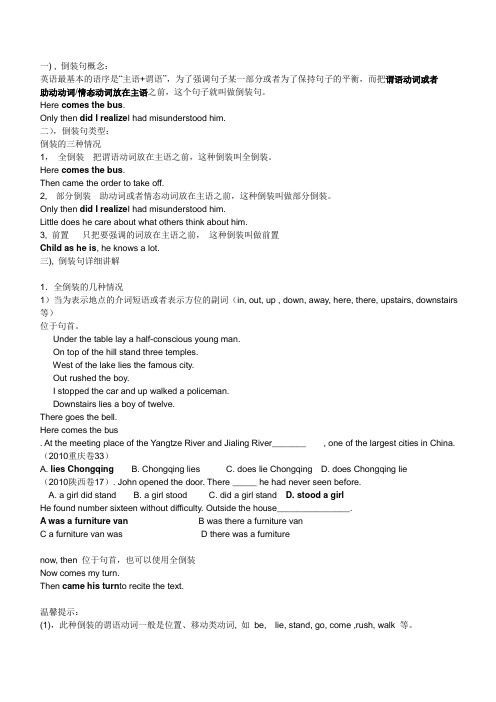
一) , 倒装句概念:英语最基本的语序是“主语+谓语”,为了强调句子某一部分或者为了保持句子的平衡,而把谓语动词或者助动动词/情态动词放在主语之前,这个句子就叫做倒装句。
Here comes the bus.Only then did I realize I had misunderstood him.二),倒装句类型:倒装的三种情况1,全倒装把谓语动词放在主语之前,这种倒装叫全倒装。
Here comes the bus.Then came the order to take off.2, 部分倒装助动词或者情态动词放在主语之前,这种倒装叫做部分倒装。
Only then did I realize I had misunderstood him.Little does he care about what others think about him.3, 前置只把要强调的词放在主语之前,这种倒装叫做前置Child as he is, he knows a lot.三), 倒装句详细讲解1.全倒装的几种情况1)当为表示地点的介词短语或者表示方位的副词(in, out, up , down, away, here, there, upstairs, downstairs 等)位于句首。
Under the table lay a half-conscious young man.On top of the hill stand three temples.West of the lake lies the famous city.Out rushed the boy.I stopped the car and up walked a policeman.Downstairs lies a boy of twelve.There goes the bell.Here comes the bus. At the meeting place of the Yangtze River and Jialing River_______ , one of the largest cities in China. (2010重庆卷33)A. lies ChongqingB. Chongqing liesC. does lie ChongqingD. does Chongqing lie(2010陕西卷17). John opened the door. There _____ he had never seen before.A. a girl did standB. a girl stoodC. did a girl standD. stood a girlHe found number sixteen without difficulty. Outside the house_______________.A was a furniture vanB was there a furniture vanC a furniture van wasD there was a furniturenow, then 位于句首,也可以使用全倒装Now comes my turn.Then came his turn to recite the text.温馨提示:(1),此种倒装的谓语动词一般是位置、移动类动词, 如be, lie, stand, go, come ,rush, walk 等。
倒装句讲解及巩固提升练习(有答案)
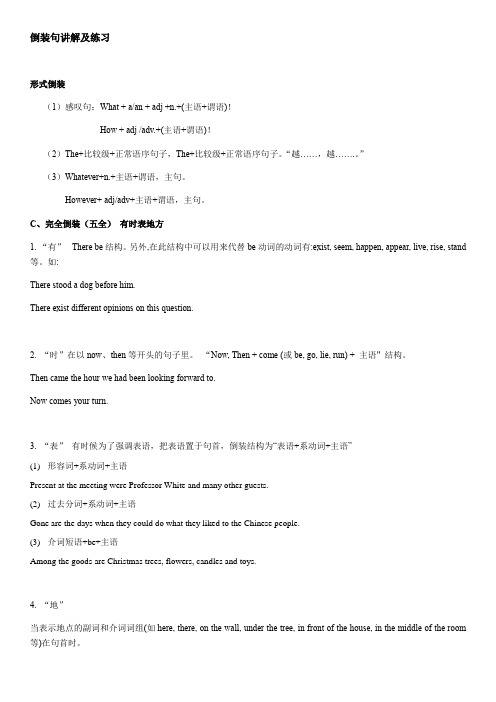
倒装句讲解及练习形式倒装(1)感叹句:What + a/an + adj +n.+(主语+谓语)!How + adj /adv.+(主语+谓语)!(2)The+比较级+正常语序句子,The+比较级+正常语序句子。
“越……,越…….。
”(3)Whatever+n.+主语+谓语,主句。
However+ adj/adv+主语+谓语,主句。
C、完全倒装(五全)有时表地方1. “有”There be结构。
另外,在此结构中可以用来代替be动词的动词有:exist, seem, happen, appear, live, rise, stand 等。
如:There stood a dog before him.There exist different opinions on this question.2. “时”在以now、then等开头的句子里。
“Now, Then + come (或be, go, lie, run) + 主语" 结构。
Then came the hour we had been looking forward to.Now comes your turn.3. “表”有时候为了强调表语,把表语置于句首,倒装结构为“表语+系动词+主语”(1)形容词+系动词+主语Present at the meeting were Professor White and many other guests.(2)过去分词+系动词+主语Gone are the days when they could do what they liked to the Chinese people.(3)介词短语+be+主语Among the goods are Christmas trees, flowers, candles and toys.4. “地”当表示地点的副词和介词词组(如here, there, on the wall, under the tree, in front of the house, in the middle of the room 等)在句首时。
倒装句全面讲解和练习

初中英语倒装句(一)倒装句的意义1、适应一定的语法结构的需要,主要是指疑问句句型结构的需要。
. Was the People’s Liberation Army founded in 1927?2、为了强调某一部分,而把这部分放到句首,构成倒装。
. Never have I been late for school this term.(二)倒装的使用情况一、部分倒装:就是把谓语中的be动词、助动词或情态动词置于主语前面。
常见于下列几种情况:(一). only所修饰的副词,介词短语或状语从句放在句首时,要用:only+ 状语+ be /助动词/情态动词+主语及其他例如:Only when he told me the news did I know what had happened.注意:only修饰主语时,不需要倒装。
例如:Among all the people, only you know the truth.小试牛刀: Only in this way ________to make improvement in the operating system.A. you can hopeB. you did hopeC. can you hopeD. did you hope(二).含有否定意义的副词或连词放在句首时。
如:never, little, seldom, not, not only, not until, no sooner (…than), hardly (…when), rarely, scarcely, in no way等。
例如:We seldom get up at four in the morning.= Seldom do we get up at four in the morning.Not a single word from him could express his feelings.(1) hardly…when; scarcely…when…; no sooner…than… 可以用正常语序had hardly done when… did 或用倒装句式Hardly had + 主语+ done when… did 句式。
倒装知识点详解及习题,带详解
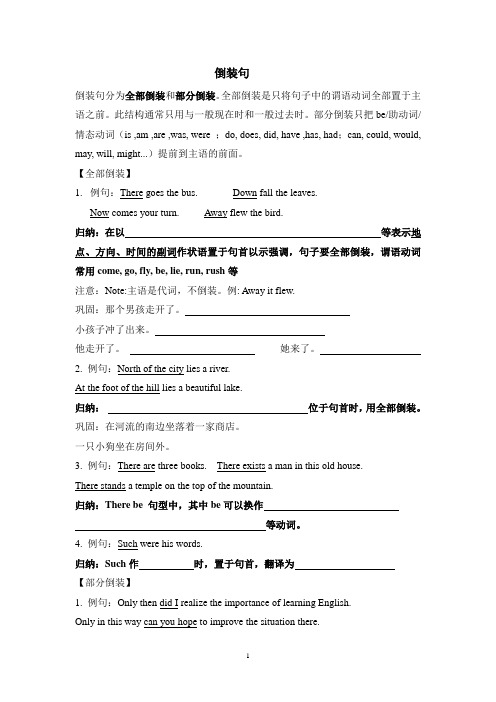
倒装句倒装句分为全部倒装和部分倒装。
全部倒装是只将句子中的谓语动词全部置于主语之前。
此结构通常只用与一般现在时和一般过去时。
部分倒装只把be/助动词/情态动词(is ,am ,are ,was, were ;do, does, did, have ,has, had;can, could, would, may, will, might...)提前到主语的前面。
【全部倒装】1.例句:There goes the bus. Down fall the leaves.Now comes your turn. Away flew the bird.归纳:在以等表示地点、方向、时间的副词作状语置于句首以示强调,句子要全部倒装,谓语动词常用come, go, fly, be, lie, run, rush等注意:Note:主语是代词,不倒装。
例: Away it flew.巩固:那个男孩走开了。
小孩子冲了出来。
他走开了。
她来了。
2. 例句:North of the city lies a river.At the foot of the hill lies a beautiful lake.归纳:位于句首时,用全部倒装。
巩固:在河流的南边坐落着一家商店。
一只小狗坐在房间外。
3. 例句:There are three books. There exists a man in this old house.There stands a temple on the top of the mountain.归纳:There be 句型中,其中be可以换作等动词。
4. 例句:Such were his words.归纳:Such作时,置于句首,翻译为【部分倒装】1. 例句:Only then did I realize the importance of learning English.Only in this way can you hope to improve the situation there.Only after he came back was I able to see him.归纳:only所修饰的放在句首时, 要进行部分倒装,主倒从不倒注:only修饰主语,不倒装,如:Only socialism can save China.Only he can do this job.2. 例句:Never have I seen a better film. Seldom does he go to the park.In no case did he give in to the enemy.归纳:位于句首时,用部分倒装。
英语倒装句练习题20篇及解析

英语倒装句练习题20篇及解析一、倒装句1.–I usually go hiking with my friends.-- ____do I.A. NorB. SoC. Neither【答案】 B【解析】【分析】句意:一一我经常和朋发一起去徒步旅行。
一一我也是。
肯定句后跟”so+谓语+主语“,表示某人某物也……;否定句后跟"Neither/Nor+谓语+主语”,表示某人某物也不……。
本题前句是肯定句,故选B。
2.— I think the plan is just a waste of time. What do you think?— Well, if you don't support the plan, ________.A. neither do IB. so do IC. neither will ID. so will I【答案】 C【解析】【分析】句意:——我认为这个计划只是在浪费时间。
您是怎么想的?——好,如果你不支持这个计划,我也不支持。
Neither+助动词+主语,表示主语也不是……;这里是if引导的条件状语从句,主句用一般将来时,从句用一般现在时态,这里是主句,故助动词用will。
根据题意,故选C。
【点评】考查倒装句,注意Neither+助动词+主语,表示主语也不是这样;so+助动词+主语,表示主语也是这样。
3.—Oh, my god! Recently I have put on 5 pounds.— . I think I should lose weight.A. So do IB. So have IC. Neither do ID. Neither have I【答案】 B【解析】【分析】句意:—啊,我的天呀!最近我长胖了五磅。
—我也是,我认为我应该减减肥了。
so +主语+助动词/情态动词/系动词:某某确实如此,主语与上文是同一人。
So+助动词/情态动词/系动词+主语:某某也如此,主语与上文不是同一人,表示后者适合前者。
英语倒装句解题技巧讲解及练习题(含答案)及解析
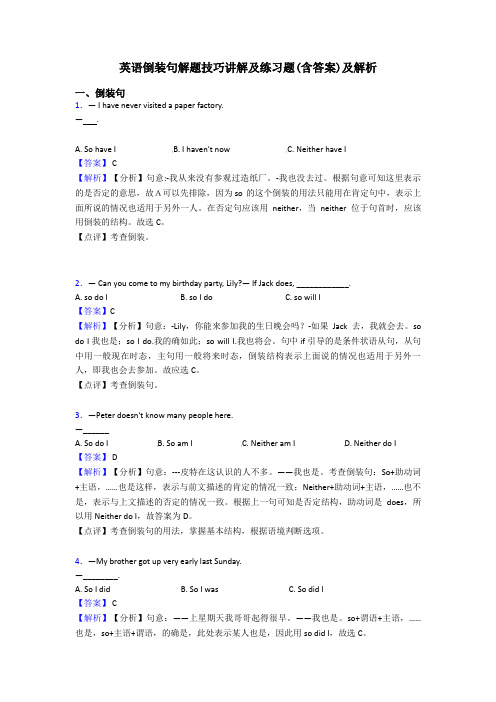
英语倒装句解题技巧讲解及练习题(含答案)及解析一、倒装句1.— I have never visited a paper factory.— .A. So have IB. I haven't nowC. Neither have I【答案】 C【解析】【分析】句意:-我从来没有参观过造纸厂。
-我也没去过。
根据句意可知这里表示的是否定的意思,故A可以先排除,因为so 的这个倒装的用法只能用在肯定句中,表示上面所说的情况也适用于另外一人。
在否定句应该用neither,当neither 位于句首时,应该用倒装的结构。
故选C。
【点评】考查倒装。
2.— Can you come to my birthday party, Lily?— If Jack does, ____________.A. so do IB. so I doC. so will I【答案】C【解析】【分析】句意:-Lily,你能来参加我的生日晚会吗?-如果Jack去,我就会去。
so do I我也是;so I do.我的确如此;so will I.我也将会。
句中if引导的是条件状语从句,从句中用一般现在时态,主句用一般将来时态,倒装结构表示上面说的情况也适用于另外一人,即我也会去参加。
故应选C。
【点评】考查倒装句。
3.—Peter doesn't know many people here.—______A. So do IB. So am IC. Neither am ID. Neither do I【答案】 D【解析】【分析】句意:---皮特在这认识的人不多。
——我也是。
考查倒装句:So+助动词+主语,……也是这样,表示与前文描述的肯定的情况一致;Neither+助动词+主语,……也不是,表示与上文描述的否定的情况一致。
根据上一句可知是否定结构,助动词是does,所以用Neither do I,故答案为D。
【点评】考查倒装句的用法,掌握基本结构,根据语境判断选项。
倒装句讲解及练习-情态动词+have done 练习
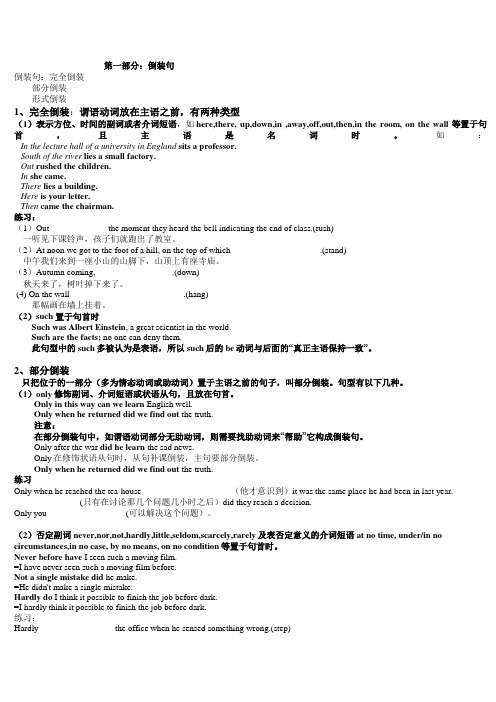
第一部分:倒装句倒装句:完全倒装部分倒装形式倒装1、完全倒装:谓语动词放在主语之前,有两种类型(1)表示方位、时间的副词或者介词短语,如here,there, up,down,in ,away,off,out,then,in the room, on the wall等置于句首,且主语是名词时。
如:In the lecture hall of a university in England sits a professor.South of the river lies a small factory.Out rushed the children.In she came.There lies a building.Here is your letter.Then came the chairman.练习:(1)Out _____________the moment they heard the bell indicating the end of class.(rush)一听见下课铃声,孩子们就跑出了教室。
(2)At noon we got to the foot of a hill, on the top of which ____________________.(stand)中午我们来到一座小山的山脚下,山顶上有座寺庙。
(3)Autumn coming, _________________.(down)秋天来了,树叶掉下来了。
(4) On the wall__________________________.(hang)那幅画在墙上挂着。
(2)such 置于句首时Such was Albert Einstein, a great scientist in the world.Such are the facts; no one can deny them.此句型中的such多被认为是表语,所以such后的be动词与后面的“真正主语保持一致”。
倒装句讲解及练习高中带答案解析
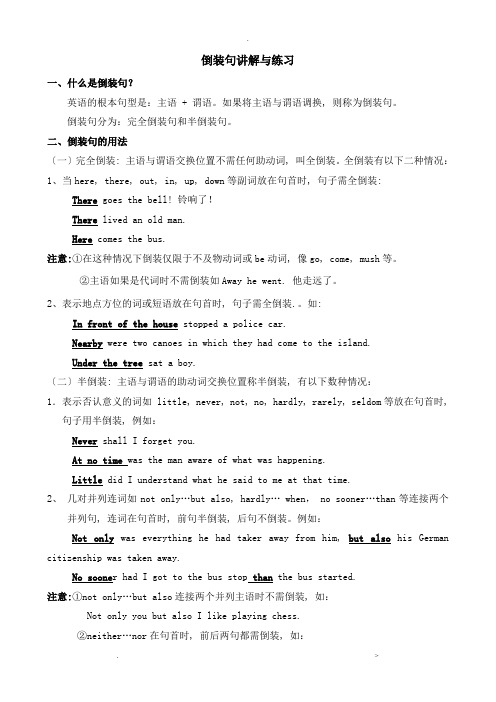
倒装句讲解与练习一、什么是倒装句?英语的根本句型是:主语 + 谓语。
如果将主语与谓语调换, 则称为倒装句。
倒装句分为:完全倒装句和半倒装句。
二、倒装句的用法〔一〕完全倒装: 主语与谓语交换位置不需任何助动词, 叫全倒装。
全倒装有以下二种情况:1、当here, there, out, in, up, down等副词放在句首时, 句子需全倒装:There goes the bell! 铃响了!There lived an old man.Here comes the bus.注意:①在这种情况下倒装仅限于不及物动词或be动词, 像go, come, mush等。
②主语如果是代词时不需倒装如Away he went. 他走远了。
2、表示地点方位的词或短语放在句首时, 句子需全倒装.。
如:In front of the house stopped a police car.Nearby were two canoes in which they had come to the island.Under the tree sat a boy.〔二〕半倒装: 主语与谓语的助动词交换位置称半倒装, 有以下数种情况:1.表示否认意义的词如 little, never, not, no, hardly, rarely, seldom等放在句首时, 句子用半倒装, 例如:Never shall I forget you.At no time was the man aware of what was happening.Little did I understand what he said to me at that time.2、几对并列连词如not only…but also, hardly… when, no sooner…than等连接两个并列句, 连词在句首时, 前句半倒装, 后句不倒装。
例如:Not only was everything he had taker away from him, but also his German citizenship was taken away.No soone r had I got to the bus stop than the bus started.注意:①not only…but also连接两个并列主语时不需倒装, 如:Not only you but also I like playing chess.②neither…nor在句首时, 前后两句都需倒装, 如:Neither do I have a sister nor does my husband.3、only放在句首强调状语时, 主句用半倒装。
倒装句精简整理版及练习解析
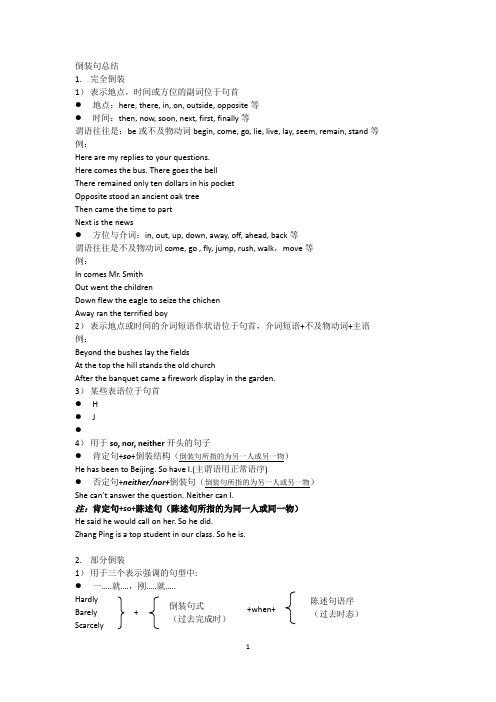
Had you not told me about the matter,Ishould never have known the whole thing.
虚拟知识回顾:
6)让步状语从句中as/though
形容词
Hardly anybody likes him because he is so rude
At no time, by no means, under/in no circumstance, in no way, in no case, on no account, on no consideration.
C.Each other have we seen never before
D.Never before have we seen each other
倒装句练习
1.His mother had talked to him for many minutes while he was watching TV, but ___.
A. a little did he hearB. little did he hear
C. little heard heD. a little heard he
例:
At no timewill China be the first to use nuclear weapons.
In no case shall we give up our plan
On no account must this switch be touched
Under no circumstances could we agree to such a principle.
英语倒装句讲解与练习

倒装句讲解与练习一、完全倒装:1.here 和there位于句首时的倒装表示地点的here和there位于句首时,其后用完全倒装形式。
这类倒装句的谓语通常是动词be和come, go等表示移动或动态的不及物动词:Here’s Tom. 汤姆在这里。
Here comes the bus. 公共汽车来了。
There goes the last train. 最后一班火车开走了。
注意:(1) 以上倒装句中的谓语动词come和go不能用进行时态,即不能说Here is coming the bus。
(2) 若主语为代词,则不倒装:Here I am. 我在这儿。
/ 我来了。
Here it comes. 它来了。
(3) 其中的动词有时也可能是stand, lie, live等表示状态的动词(表示存在):There stood a desk against the wall. 靠墙放着一张书桌。
Once upon a time there lived a man known by the name of Beef. 从前有个人名叫比夫。
2.away和down等位于句首时的倒装地点副词away, down, in, off, out, over, round, up等位于句首时,其后用完全倒装语序。
这类倒装句的谓语通常表示动态的不及物动词:Away went the runners. 赛跑选手们跑远了。
Round and round flew the plane. 飞机盘旋着。
The door opened and in came Mr Smith. 门开了,史密斯先生进了来。
注意:若主语为人称代词,则不能用倒装:Away he went. 他跑远了。
3.状语或表语位于句首时的倒装为了保持句子平衡或使上下文衔接紧密,有时可将状语或表语置于句首,句中主语和谓语完全倒装:Among these people was his friend Jim. 他的朋友吉姆就在这些人当中。
高考英语倒装句讲解及练习

倒装句Ⅰ.概念:倒装分为:完全倒装:整个谓语移至主语前面叫完全倒装。
部分倒装:只把助动词、系动词或情态动词放在主语之前叫部分倒装。
Exercise:全倒还是半倒?1. In the centre of the square stands a high monument.2. Never has our country been so strong as it is today.3. Here comes the bus.4. Not only did the teacher praise his students but also he gave them a big prize.5. Many years ago there lived an old man in the wooden house.6. Now comes your turn.7. Only in this way can you work it out.8. So excited did she look that she couldn’t say a word.完全倒装1.当副词here, there, out , in , up , down, away, off, now, then, over等位于句首,且主语是具体的名词时,主谓直接倒装;Our teacher came in. =In came our teacher.Your turn comes now. =Now ________________地点状语的介词短语放在句首。
under a big tree sat an old man3. 充当表语的介词短语、形容词、分词位于句首时,主谓直接倒装。
Christmas trees, flowers, candles and toys are among the goods.●Among the goods are Christmas trees, flowers, candles and toys.A boy who is 6 years old is lying on the floor.●Lying on the floor __________________________________Exercise :1. An interpreter was standing beside the table.=2. A group of young people are seated on the ground.=3. The time to part came then. =4. They climbed up, out of breath.=部分倒装:1.so, neither, nor 作部分倒装,表示" 也" 、" 也不"。
高中语法倒装句讲解及练习

三、知识讲解
英语句子的自然顺序是主语在前,谓语在后(主语+谓语)。把谓语动词放在主语之前(谓语+主语) ,就叫倒 装结构。如果全部谓语放在主语之前,叫全部倒装;如果只把助动词或be动词放在主语之前就叫部分倒 装。 eg.I love English.(基本语序:主语+谓语+宾语) Here came the headmaster. ( 完全倒装:谓语+主语) Never will I forgive you. ( 部分倒装:助动词/情态动词+主语+谓语) 备注: 在英语中,由于语法结构的要求,或是由于修辞的需要,往往要改变句子的自然语序,把一些本应置于主语之 后的句子成分提到主语之前。我们称这种语序的变化为“倒装语序”。
倒装句
一、教学目标
1.了解倒装句的含义; . 2.掌握完全倒装所涉及的情况; eg.表示方向的副词out, in, up, down等置于句首,要用全部倒装; 3.掌握部分倒装所涉及的情况; eg. only修饰的副词,介词短语或状语从句放句首时,要部分倒装。 Not until放在句首,从句不倒装,主句部分倒装。 4.了解倒装句的高考考点。
(8)以so/ nor/ neither开头的句子,此类倒装用于重复前句部分内容。 ①So+be/助动词/情态动词+主语,表示“....也是;....也如此" ②Nor/ neither + be/助动词/情态动词+主语, 表示”....也不是; .... 也不一样" ③So+主语+be/助动词/情态动词,表示...的确如此” eg. I don't know how to swim, and nor does my sister. 我不知道怎样游泳,我妹妹也不知道。 She's passed the exam,and so have l. 她通过考试了,我也通过了。
(完整版)高中英语语法倒装句讲解及练习(附答案)
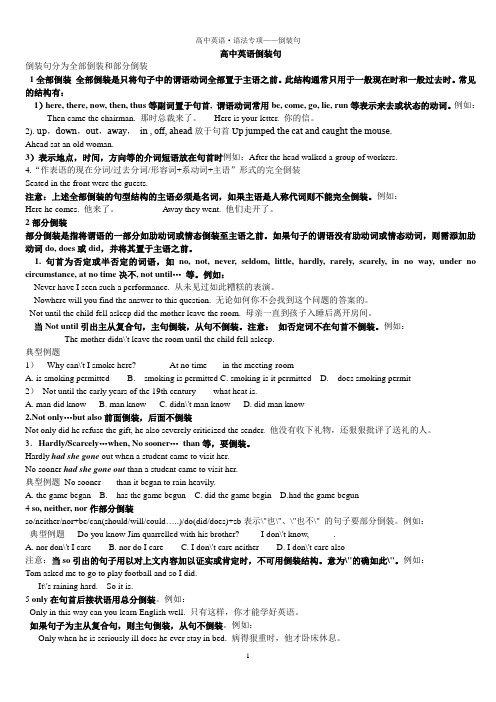
高中英语倒装句倒装句分为全部倒装和部分倒装1全部倒装全部倒装是只将句子中的谓语动词全部置于主语之前。
此结构通常只用于一般现在时和一般过去时。
常见的结构有:1)here, there, now, then, thus等副词置于句首, 谓语动词常用be, come, go, lie, run等表示来去或状态的动词。
例如:Then came the chairman. 那时总裁来了。
Here is your letter. 你的信。
2). up,down,out,away,in , off, ahead放于句首Up jumped the cat and caught the mouse.Ahead sat an old woman.3)表示地点,时间,方向等的介词短语放在句首时例如:After the head walked a group of workers.4.“作表语的现在分词/过去分词/形容词+系动词+主语”形式的完全倒装Seated in the front were the guests.注意:上述全部倒装的句型结构的主语必须是名词,如果主语是人称代词则不能完全倒装。
例如:Here he comes. 他来了。
Away they went. 他们走开了。
2部分倒装部分倒装是指将谓语的一部分如助动词或情态倒装至主语之前。
如果句子的谓语没有助动词或情态动词,则需添加助动词do, does或did,并将其置于主语之前。
1. 句首为否定或半否定的词语,如no, not, never, seldom, little, hardly, rarely, scarely, in no way, under no circumstance, at no time决不, not until…等。
例如:Never have I seen such a performance. 从未见过如此糟糕的表演。
Nowhere will you find the answer to this question. 无论如何你不会找到这个问题的答案的。
- 1、下载文档前请自行甄别文档内容的完整性,平台不提供额外的编辑、内容补充、找答案等附加服务。
- 2、"仅部分预览"的文档,不可在线预览部分如存在完整性等问题,可反馈申请退款(可完整预览的文档不适用该条件!)。
- 3、如文档侵犯您的权益,请联系客服反馈,我们会尽快为您处理(人工客服工作时间:9:00-18:30)。
英语倒装句(Inversion)主语和谓语是句子的核心,它们之间有两种语序:一是主语在谓语之前称为自然语序(Natural Order);二是主语在谓语之后则称为倒装语序(Inverted Order)。
而倒装语序中又有完全倒装 (Full Inversion)和部分倒装(Partial Inversion)完全倒装(Full Inversion):又称"全部倒装",是指将句子中的谓语动词全部置于主语之前。
此结构通常只用与一般现在时和一般过去时。
部分倒装(Partial Inversion):指将谓语的一部分如助动词或情态动词倒装至主语之前,而谓语动词无变化。
如果句中的谓语没有助动词或情态动词,则需添加助动词do, does或did,并将其置于主语之前。
英语句子的倒装一是由于语法结构的需要而进行的倒装,二是由于修辞的需要而进行的倒装。
前一种情况,倒装是必须的,否则就会出现语法错误;后一种情况,倒装是选择性的,倒装与否只会产生表达效果上的差异。
:一、部分倒装就是把谓语中的be动词、助动词或情态动词置于主语前面。
常见于下列几种情况:(一) .only所修饰的副词,介词短语或状语从句放在句首时,要用:only+状语+ be /助动词/情态动词+主语及其他Only whe n he told me the n ews did I know what had happe ned.On ly in this way can you make progress in your En glish.Only in this way can you solve this problem.注意:only修饰主语时,不需要倒装1.Only in this way ______ to make improvement in the operating system.A. you can hopeB. you did hopeC. can you hopeD. did you hope(二) .含有否定意义的副词或连词放在句首时。
如:never, little, seldom, not, not only, not un til, no sooner (…tha n), hardly (…whe n), rarely, scarcely, in no way 等。
We seldom get up at four in the morning.= Seldom do we get up at four in the morning.Not a single word from him could the enemy drag.Rarely have I heard of such a silly thing.(1) hardly …when; scarcely- when…;no soone…than… 可以用正常语序had hardly done when…did 或用倒装句式Hardly had + 主语+ done wher… did句式。
hardly所在的句子用过去完成时。
The bell hardly had rung when the class began.= Hardly had the bell rung when the class began.No sooner had he arrived in Beijing than he began to work.(2) not o nly…but also如连接两个成分时,不用倒装;连接句子时,前面的句子要用倒装。
Not only was everything that he had taken away from him, but also his German citizenship.Not only is he busy, but also I have a lot of work to do.Not only does he speak English very well, but also he speaks French well.2.I finally got the work I dreamed about. Never in all my life _______ so happy!A. did I feelB. I feltC. I had feltD. had I felt3.Not until I began to work ______ how much time I had wasted.A. didn't I realizeB. did I realizeC. I didn't realizeD. I realized 4.Nosooner___ than it began to rain heavily.A. the game beganB. has the game begunC. did the game beginD. had the game begun(三) .在so…that, such…that句型中,若把so,such引导的结构放在句首时。
So frightened was he that he did not dare to move an inch.5.So difficult ___ it to live in an English-speaking country that I was determined to learn English well.A. I've felt B have I felt C. I did feel D. did I feel(四) .省略了if的虚拟条件句中,把were, hac或should放在句首时。
If I were you, I would take the job. = Were I you, I would take the job.6.________ it rain tomorrow, we would have to put off the visit to Yangpu Bridge.A. WereB. ShouldC. WouldD. Will(五) .把副词so放在句首,表示前面所说的情况也适用于另一个人或物。
I like reading English, so does he.He used to have his further study abroad; so did I.(六) .把neither,nor放在句首,表示前面的否定内容也适用于另一个人或物。
If you won't go, neither will I.7. -I don't think I can walk any further.- ________, let's stop here for a rest.A. Neither and IB. Neither can IC. I don't think soD. I think so(七) 用于形容词/副词/名词/动词+as (though)引导的让步状语从句中注意:当表语为名词时,则名词前不加任何冠词;主谓并不倒装。
Try hard as he will, he never seems able to do the work satisfactorily. Childas he is, he knows a lot.8.________ , I have never seen anyone who's as capable as John.A. As long as I have traveledB. Now that I have traveled so muchC. Much as I have traveledD. As I have traveled so much(八).由however, no matterhow引导的让步状语从句中,把howeve叶形容词/副词,no matter how+形容词/副词放在句首时。
9.________ , mother will wait for him to have dinner together.A. However late is heB. However he is lateC. However is he lateD. However late he is二、全部倒装就是把整个谓语部分放在主语之前。
注意:谓语动词的数要与后面的主语保持一致。
常见于几种情况:(一).用于地点副词here, there方位副词out, in, up, down及时间副词now, then等开头的句子里,以示强调。
There goes the bell.Look! Here they come.这种倒装要求:主语必须是名词。
主语是人称代词时,主语和谓语语序不变。
Here it is.Away he went.这类倒装句式一般只用一般现在时和一般过去时。
Here comes the bus.Out rushed the boys.(二).当表示地点的介词短语放句首时。
注意:谓语多为be, lie, sit, stand, come, walk等不及物动词;倒装时不需要助动词。
Under the table are three white cats.In front of the tower flews a stream.10.Under a big tree _______ , half asleep.A. did sat a fat manB. a fat man satC. did a fat man satD. sat a fat man(三)there放在句首时,要用倒装句式。
在“here + bd'结构中的谓语动词有时不用be ,而用表示类似“存在”观念的其他不及物动词。
如:live, stand, come, lie, flow, en ter, rise 和appeal等0There came shouts for help from the river.There lies a large wheat field in front of the house.Many years ago there lived an old man in the wooden house.(四) .表语置于句首时,倒装结构为"表语+系动词+主语"。
